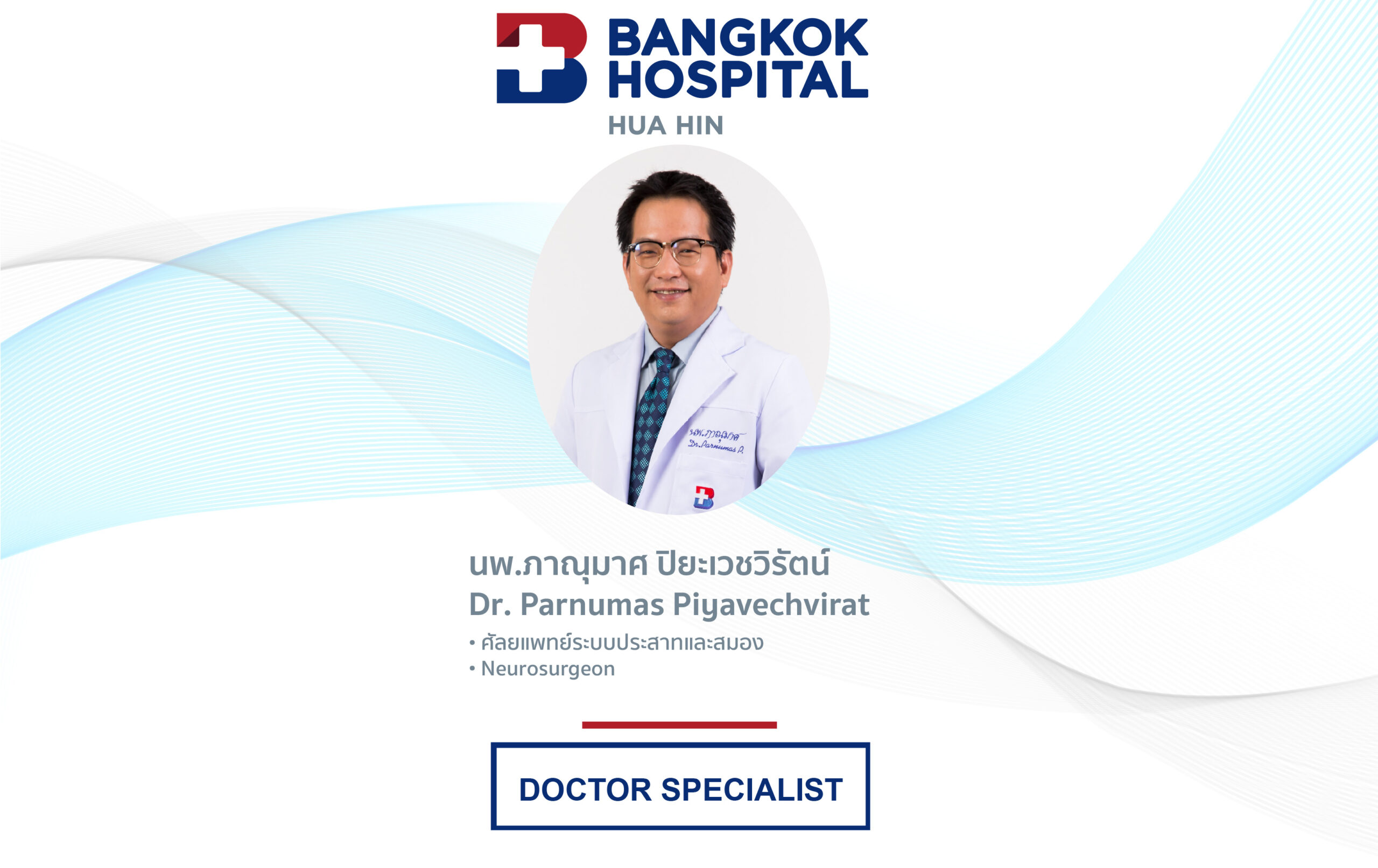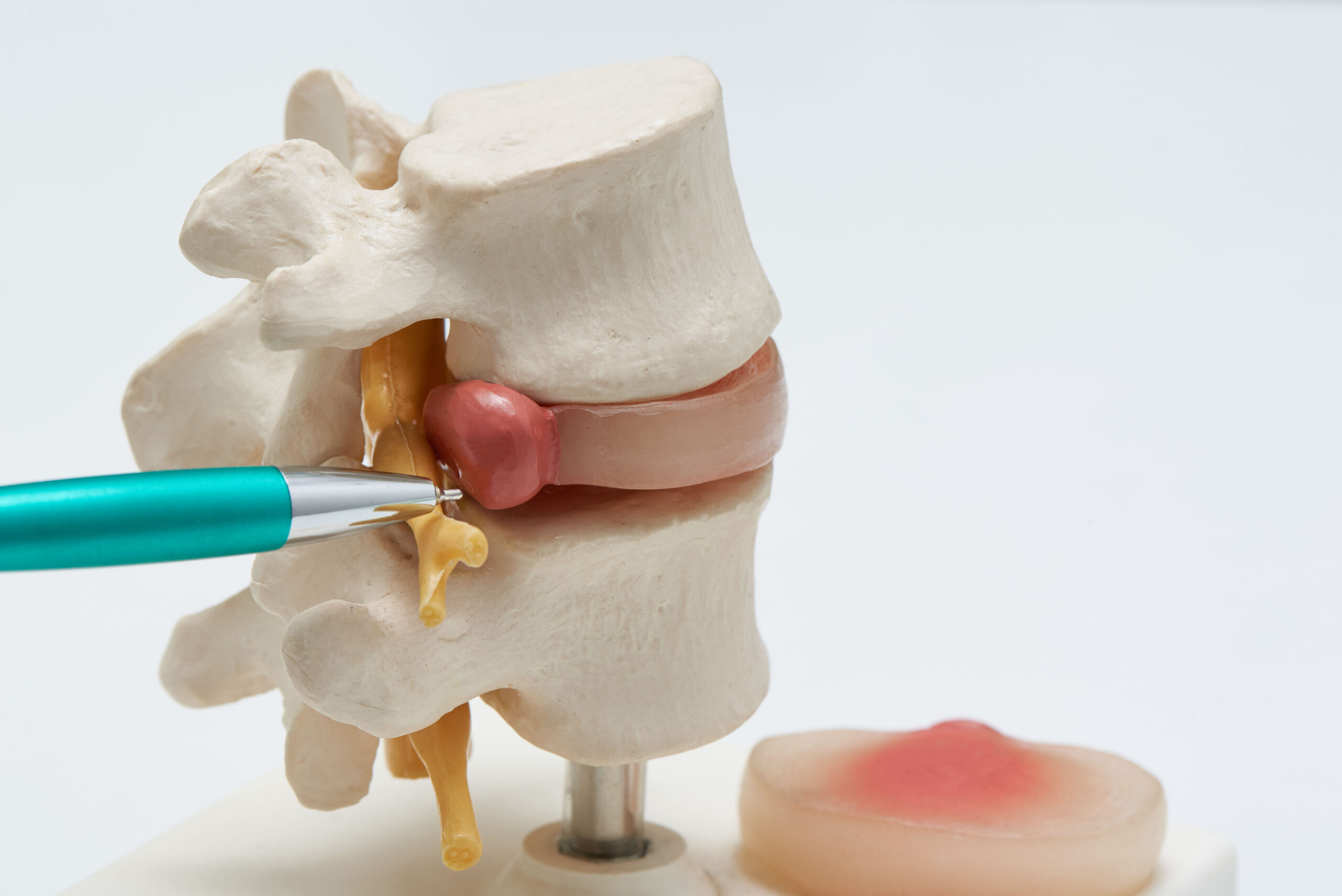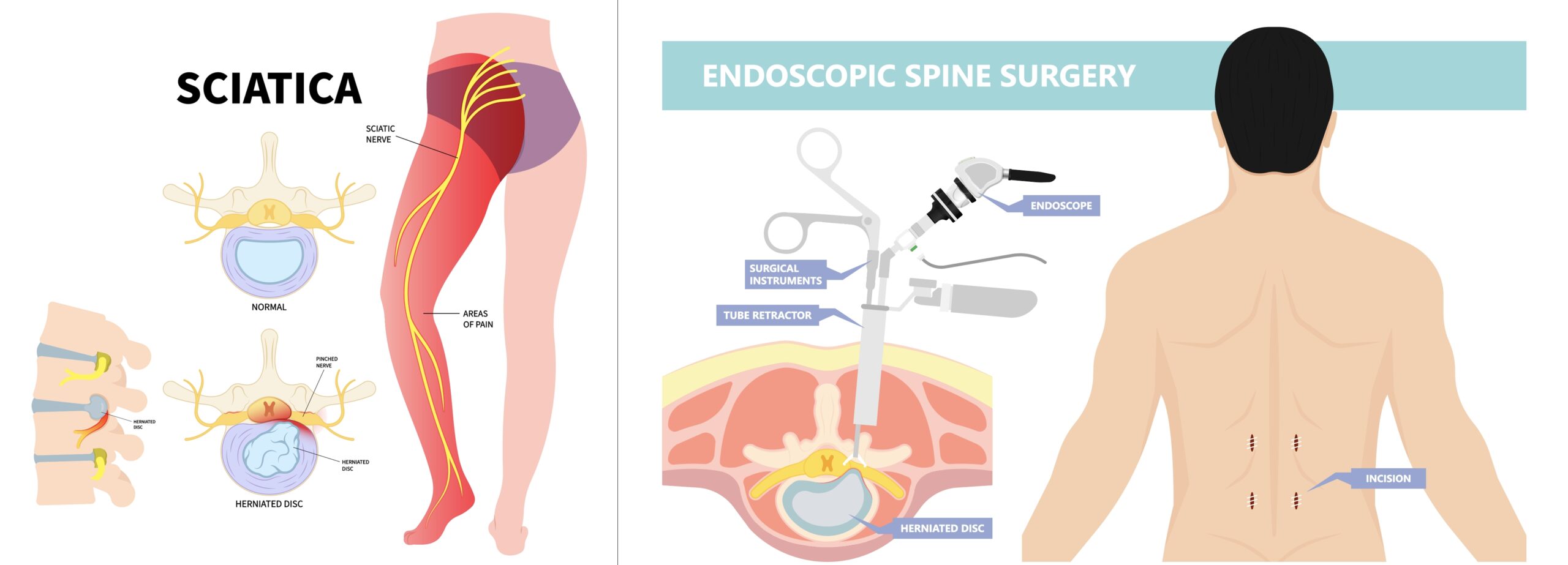Minimally Invasive Spine Surgery: A Precise Solution for Herniated Disc
Herniated disc and spinal stenosis are common health issues caused by disc degeneration or displacement, pressing on the nerves. This can lead to back pain, radiating leg pain, numbness, or muscle weakness. If left untreated, it may result in permanent disability. Currently, advanced endoscopic spine surgery offers a highly precise technique with smaller incisions and faster recovery compared to traditional surgery.
 Dr. Parnumas Piyavechvirat, our neurosurgeon and Director of Neurology at Bangkok Hospital Hua Hin, shares that minimally invasive spine surgery (MIS Spine), also known as Endoscopic Discectomy, is a procedure that uses a small camera (Endoscope) with an incision size of just 0.8 centimeters. The surgery is performed through two small incisions (Biportal) with continuous irrigation. This allows the surgeon to clearly view the nerves and the affected area, ensuring precise and effective treatment. Specialized surgical tools, such as Bipolar and Radiofrequency are used to control bleeding, minimize blood loss and enhance safety. This technique promotes faster recovery and reduces the length of hospital stay.
Dr. Parnumas Piyavechvirat, our neurosurgeon and Director of Neurology at Bangkok Hospital Hua Hin, shares that minimally invasive spine surgery (MIS Spine), also known as Endoscopic Discectomy, is a procedure that uses a small camera (Endoscope) with an incision size of just 0.8 centimeters. The surgery is performed through two small incisions (Biportal) with continuous irrigation. This allows the surgeon to clearly view the nerves and the affected area, ensuring precise and effective treatment. Specialized surgical tools, such as Bipolar and Radiofrequency are used to control bleeding, minimize blood loss and enhance safety. This technique promotes faster recovery and reduces the length of hospital stay.
 Who is Suitable for This Surgery?
MIS Spine with an endoscope is suitable for individuals with chronic back pain or pain that radiates along nerve pathways, such as in the neck, shoulders, arms, legs, or hips. It is also recommended for those experiencing muscle weakness in areas like the hands, arms, shoulders, legs, knees, or ankles. This procedure is ideal for people who have not improved with medication or physical therapy and for those seeking a quicker recovery to return to normal activities.
Benefits of Endoscopic Surgery
This surgical method uses smaller incisions, minimizing muscle and tissue damage around the spine. It also lowers the risk of complications, such as infections or excessive blood loss. This technique is ideal for those who want to avoid traditional open surgery with larger incisions. It also shortens recovery, allowing patients to return to their daily activities sooner. Most importantly, it effectively relieves back pain and leg pain.
Who is Suitable for This Surgery?
MIS Spine with an endoscope is suitable for individuals with chronic back pain or pain that radiates along nerve pathways, such as in the neck, shoulders, arms, legs, or hips. It is also recommended for those experiencing muscle weakness in areas like the hands, arms, shoulders, legs, knees, or ankles. This procedure is ideal for people who have not improved with medication or physical therapy and for those seeking a quicker recovery to return to normal activities.
Benefits of Endoscopic Surgery
This surgical method uses smaller incisions, minimizing muscle and tissue damage around the spine. It also lowers the risk of complications, such as infections or excessive blood loss. This technique is ideal for those who want to avoid traditional open surgery with larger incisions. It also shortens recovery, allowing patients to return to their daily activities sooner. Most importantly, it effectively relieves back pain and leg pain.
 Post-Surgery Care
Doctors will recommend adjusting lifestyle habits, such as maintaining good posture while sitting and exercising regularly. Patients should avoid lifting heavy objects or twisting movements during the first 4-6 weeks. After this period, physical therapy will be suggested to strengthen the back muscles.
For patients with muscle weakness, surgery can help speed up recovery. However, if nerve compression has been untreated for a long time, it may cause muscle atrophy, leading to a longer recovery and more time needed for physical therapy. Therefore, if you experience muscle weakness, it is advisable to seek a specialist as soon as possible.
Post-Surgery Care
Doctors will recommend adjusting lifestyle habits, such as maintaining good posture while sitting and exercising regularly. Patients should avoid lifting heavy objects or twisting movements during the first 4-6 weeks. After this period, physical therapy will be suggested to strengthen the back muscles.
For patients with muscle weakness, surgery can help speed up recovery. However, if nerve compression has been untreated for a long time, it may cause muscle atrophy, leading to a longer recovery and more time needed for physical therapy. Therefore, if you experience muscle weakness, it is advisable to seek a specialist as soon as possible.
 Dr. Parnumas also shares that, “Although the surgery time for both open surgery and minimally invasive surgery is not significantly different, minimally invasive surgery has the advantage of quicker wound opening and closing. This requires expertise in using specialized tools. Endoscopic discectomy for herniated disc is a modern, safe option that allows for faster recovery. If you or a family member are experiencing chronic back pain affecting daily life, do not delay seeking treatment, as it could lead to long-term health risks. It is important to consult a specialist for diagnosis and to choose the most suitable treatment option.”
**************************************************************************
For more information and booking an appointment, please contact :
Tel: 032-616-880 (7.00 – 19.00 hrs.) Out-Patient Department, ground floor
Tel. 032-616-800 Call Center, Bangkok Hospital Hua Hin
Dr. Parnumas also shares that, “Although the surgery time for both open surgery and minimally invasive surgery is not significantly different, minimally invasive surgery has the advantage of quicker wound opening and closing. This requires expertise in using specialized tools. Endoscopic discectomy for herniated disc is a modern, safe option that allows for faster recovery. If you or a family member are experiencing chronic back pain affecting daily life, do not delay seeking treatment, as it could lead to long-term health risks. It is important to consult a specialist for diagnosis and to choose the most suitable treatment option.”
**************************************************************************
For more information and booking an appointment, please contact :
Tel: 032-616-880 (7.00 – 19.00 hrs.) Out-Patient Department, ground floor
Tel. 032-616-800 Call Center, Bangkok Hospital Hua Hin
 Dr. Parnumas Piyavechvirat, our neurosurgeon and Director of Neurology at Bangkok Hospital Hua Hin, shares that minimally invasive spine surgery (MIS Spine), also known as Endoscopic Discectomy, is a procedure that uses a small camera (Endoscope) with an incision size of just 0.8 centimeters. The surgery is performed through two small incisions (Biportal) with continuous irrigation. This allows the surgeon to clearly view the nerves and the affected area, ensuring precise and effective treatment. Specialized surgical tools, such as Bipolar and Radiofrequency are used to control bleeding, minimize blood loss and enhance safety. This technique promotes faster recovery and reduces the length of hospital stay.
Dr. Parnumas Piyavechvirat, our neurosurgeon and Director of Neurology at Bangkok Hospital Hua Hin, shares that minimally invasive spine surgery (MIS Spine), also known as Endoscopic Discectomy, is a procedure that uses a small camera (Endoscope) with an incision size of just 0.8 centimeters. The surgery is performed through two small incisions (Biportal) with continuous irrigation. This allows the surgeon to clearly view the nerves and the affected area, ensuring precise and effective treatment. Specialized surgical tools, such as Bipolar and Radiofrequency are used to control bleeding, minimize blood loss and enhance safety. This technique promotes faster recovery and reduces the length of hospital stay.
 Who is Suitable for This Surgery?
MIS Spine with an endoscope is suitable for individuals with chronic back pain or pain that radiates along nerve pathways, such as in the neck, shoulders, arms, legs, or hips. It is also recommended for those experiencing muscle weakness in areas like the hands, arms, shoulders, legs, knees, or ankles. This procedure is ideal for people who have not improved with medication or physical therapy and for those seeking a quicker recovery to return to normal activities.
Benefits of Endoscopic Surgery
This surgical method uses smaller incisions, minimizing muscle and tissue damage around the spine. It also lowers the risk of complications, such as infections or excessive blood loss. This technique is ideal for those who want to avoid traditional open surgery with larger incisions. It also shortens recovery, allowing patients to return to their daily activities sooner. Most importantly, it effectively relieves back pain and leg pain.
Who is Suitable for This Surgery?
MIS Spine with an endoscope is suitable for individuals with chronic back pain or pain that radiates along nerve pathways, such as in the neck, shoulders, arms, legs, or hips. It is also recommended for those experiencing muscle weakness in areas like the hands, arms, shoulders, legs, knees, or ankles. This procedure is ideal for people who have not improved with medication or physical therapy and for those seeking a quicker recovery to return to normal activities.
Benefits of Endoscopic Surgery
This surgical method uses smaller incisions, minimizing muscle and tissue damage around the spine. It also lowers the risk of complications, such as infections or excessive blood loss. This technique is ideal for those who want to avoid traditional open surgery with larger incisions. It also shortens recovery, allowing patients to return to their daily activities sooner. Most importantly, it effectively relieves back pain and leg pain.
 Post-Surgery Care
Doctors will recommend adjusting lifestyle habits, such as maintaining good posture while sitting and exercising regularly. Patients should avoid lifting heavy objects or twisting movements during the first 4-6 weeks. After this period, physical therapy will be suggested to strengthen the back muscles.
For patients with muscle weakness, surgery can help speed up recovery. However, if nerve compression has been untreated for a long time, it may cause muscle atrophy, leading to a longer recovery and more time needed for physical therapy. Therefore, if you experience muscle weakness, it is advisable to seek a specialist as soon as possible.
Post-Surgery Care
Doctors will recommend adjusting lifestyle habits, such as maintaining good posture while sitting and exercising regularly. Patients should avoid lifting heavy objects or twisting movements during the first 4-6 weeks. After this period, physical therapy will be suggested to strengthen the back muscles.
For patients with muscle weakness, surgery can help speed up recovery. However, if nerve compression has been untreated for a long time, it may cause muscle atrophy, leading to a longer recovery and more time needed for physical therapy. Therefore, if you experience muscle weakness, it is advisable to seek a specialist as soon as possible.
 Dr. Parnumas also shares that, “Although the surgery time for both open surgery and minimally invasive surgery is not significantly different, minimally invasive surgery has the advantage of quicker wound opening and closing. This requires expertise in using specialized tools. Endoscopic discectomy for herniated disc is a modern, safe option that allows for faster recovery. If you or a family member are experiencing chronic back pain affecting daily life, do not delay seeking treatment, as it could lead to long-term health risks. It is important to consult a specialist for diagnosis and to choose the most suitable treatment option.”
**************************************************************************
For more information and booking an appointment, please contact :
Tel: 032-616-880 (7.00 – 19.00 hrs.) Out-Patient Department, ground floor
Tel. 032-616-800 Call Center, Bangkok Hospital Hua Hin
Dr. Parnumas also shares that, “Although the surgery time for both open surgery and minimally invasive surgery is not significantly different, minimally invasive surgery has the advantage of quicker wound opening and closing. This requires expertise in using specialized tools. Endoscopic discectomy for herniated disc is a modern, safe option that allows for faster recovery. If you or a family member are experiencing chronic back pain affecting daily life, do not delay seeking treatment, as it could lead to long-term health risks. It is important to consult a specialist for diagnosis and to choose the most suitable treatment option.”
**************************************************************************
For more information and booking an appointment, please contact :
Tel: 032-616-880 (7.00 – 19.00 hrs.) Out-Patient Department, ground floor
Tel. 032-616-800 Call Center, Bangkok Hospital Hua Hin